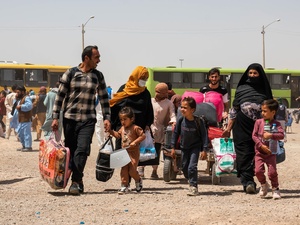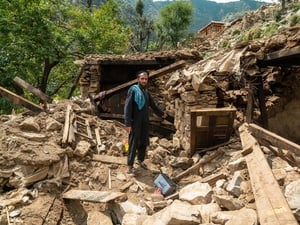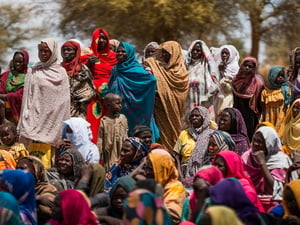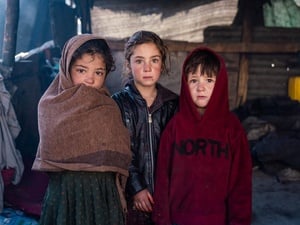Afghanistan emergency
Afghanistan emergency
UNHCR's top official for Afghanistan, Filippo Grandi, is scheduled to return to Kabul from Pakistan as soon as possible with senior officials from other UN agencies in a bid to jump-start what could be one of the most daunting humanitarian efforts since the Balkans wars of the 1990s. The return - which could take place in the next 48 hours - will pave the way for the deployment of a larger number of UNHCR staff in all key cities of Afghanistan. UN humanitarian agencies are facing the challenge of helping millions of people affected by 22 years of conflict, including more than 1 million internally displaced within Afghanistan and some 4 million outside the country, primarily in neighbouring Pakistan and Iran. UNHCR, which has worked in the region for two decades, will help on several fronts: stabilizing the population inside Afghanistan; helping those who keep fleeing the country; and eventually aiding those wishing to go home. Some 4.65 million Afghan refugees have returned home since 1988.
As security allows, UNHCR plans a quick re-establishment of its international presence throughout Afghanistan, with field offices in all five major cities - Kabul, Mazar-i-Sharif, Herat, Kandahar and Jalalabad. Our local staff, who were unable to work normally during the last few weeks, have now resumed work in some of the key places.
In Kabul, UNHCR's four remaining female staff came to the office today for the first time since the Taliban took control of the city in September 1996. The four women have been barred from the office since then by the Taliban, but they were initially allowed to work in the field. In 1999, however, the Taliban barred them from doing any work whatsoever and they have remained largely confined to their homes since then. Obviously, we are absolutely delighted to have them back on the job.
Thanks to our local colleagues, UNHCR's office in the western city of Herat is now once again fully operational, with e-mail and telecommunications. Today (Friday) UNHCR staff, together with IOM and WHO partners, are distributing 1,000 tents and medicines to internally displaced people in Herat.
In the north, supplies are still being ferried across the Amu Daria River to the Afghanistan town of Heraton from the Uzbek town of Termez. The supplies will then be taken to Mazar-i-Sharif and further south.
Staff report that the situation is still difficult in Mazar-i-Sharif, where the UNHCR office was thoroughly gutted by looters. Even window frames and door frames were carted off. UNHCR local staff say tensions did ease somewhat in the town on Thursday after a few days of looting and skirmishes between Northern Alliance forces and remnants of the Taliban troops. UNHCR staff have so far been unable to re-open the offices in Kandahar and Jalalabad.
Recent territorial gains by the Northern Alliance have created the potential for wide-scale aid deliveries to northern Afghanistan, reducing fears of a humanitarian crisis in these areas during the winter. However, UNHCR remains concerned about a possible influx of new refugees into Pakistan, especially from southern areas of Afghanistan.
In southern Pakistan yesterday, we shifted a record number of Afghan refugees from Killi Faizo staging site at the Chaman border crossing south-east of Kandahar. More than 1,340 people representing some 280 families were transported 16 km inland to the newly established Roghani camp.
Aid workers at Chaman were besieged by hundreds of Afghan refugee families camped at the Killi Faizo transit site on Thursday who begged to be urgently shifted away from the exposed border camp to Roghani, where they can be better assisted. More than 2,460 Afghans are currently sheltered at the new Roghani camp, while almost 3,000 are still in Killi Faizo awaiting relocation away from the border area.
The Chaman crossing, between the Pakistani city of Quetta and the Taliban's main stronghold at Kandahar, was reported to be firmly closed on Thursday, unlike previous weeks when the officially closed border crossing saw large movements of people and commerce. Nevertheless, more than 300 Afghans who somehow managed to cross were still waiting to be pre-registered at the Killi Faizo site late on Thursday. More Afghan families were reported to be in the frontier zone's no-man's-land this morning.
Over the coming days UNHCR plans to relocate all the refugees in the exposed Killi Faizo encampment to Roghani. A much-reduced Killi Faizo site will be used to temporarily shelter desperate new arrivals prior to their transfer to Roghani under an agreement between the government of Pakistan and UNHCR. Roghani can accommodate 40,000 people. Other sites are being developed at Dara and Tor Tangi.
Baluchistan provincial authorities told UNHCR on Thursday that several thousand Afghans could soon enter Pakistan from Helmand and Kandahar provinces, or may have already arrived in remote border areas near Dalbandin. A UNHCR mission that returned from the Dalbandin region, south-west of Quetta, on Thursday noted that some 1,368 new Afghan refugees had settled over the past two weeks in five old refugee settlements in the area. Following the fresh Pakistan government reports, UNHCR and Islamic Relief will on Saturday send supplies for some 6,000 people to Dalbandin to ensure that initial supplies of aid goods are pre-positioned in the area. A UNHCR team will return to Dalbandin on Monday, and is seeking government of Pakistan approval to visit the Amri border crossing to check on reports of a fresh, large-scale influx from Helmand and Kandahar provinces into remote areas of Baluchistan.









